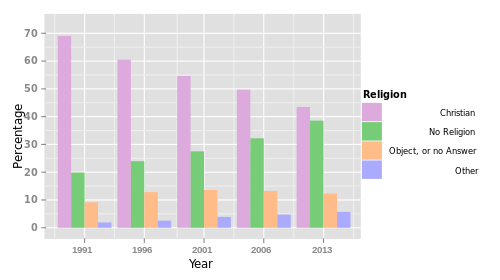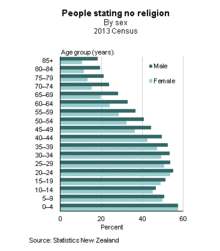Irreligion in New Zealand
Irreligion – the absence of religious belief or affiliation – is an increasing trend in New Zealand. Although New Zealand has no established religion, Christianity has been the majority religious affiliation since European settlement in the 19th century. The trend toward irreligion may indicate increasing secularisation as well as a rise in non-institutional spiritual belief.
Demographics


Statistics New Zealand gathers information on religious affiliation in the five-yearly census. Completing a census form is compulsory by law for every person in New Zealand on census night[1] but respondents are able to object to answering the question of religious affiliation,[2] and around 6% do object.[3] The trend shows an increasing proportion of residents in New Zealand declaring no religious affiliation. In the 1991 census, 20.2% were in this category.[4] The proportion more than doubled in two decades, reaching 41.9% in the 2013 census.[5] Younger people were more likely to indicate they had no religion; except in the 10-14 age bracket, the majority of people under 35 at the 2013 Census stated they had no religion. More males than females stated they had no religion, particularly among people aged 65 years or over.[6]
There is significant debate among sociologists about the interpretation of this trend in census data.[7] The increase in those indicating 'no religion' is often cited in support of the secularisation thesis, although more detailed research of this group has thrown this assumption into question.[8] An alternative theory is that the data indicates a decline in institutional religious affiliation rather than simply a decrease in spiritual belief.[9] A 1985 survey showed that around one-quarter of those answering 'no religion' may believe in a god and that, conversely, between 7 percent and 36 percent of Christians (depending on their denomination) did not believe in the existence of deities.[10]
The International Social Survey Programme was conducted in New Zealand by Massey University in 2008. It received mail-responses from around one thousand New Zealanders above the age of 18, surveying issues of religious belief and practice. The results of this survey indicated that 72% of the population believe in God or a higher power, 15% are agnostic, and 13% are atheist (with a 3% margin of error).[11]
According to a report by the American Physical Society, religion may die out in New Zealand and eight other Western world countries.[12][13][14]
If current trends persist, those stating no religion will outnumber those who state a religious affiliation by the 2026 census.[15]
Irreligion in society
The New Zealand Association of Rationalists and Humanists and the Humanist Society of New Zealand promote a secular view of life without reference to supernatural agencies as one of its aims.
A campaign to create advertisements similar to the Atheist Bus Campaign in the United Kingdom began a fund-raising drive on 10 December 2009,[16] and reached its initial target of $10,000 in donations within 48 hours, making it one of the most successful atheist campaigns of all time.[17]
See also
References
- ↑ "Participation in the Census". Statistics New Zealand. Retrieved 2010-06-09.
- ↑ "Religious Affiliation Questionnaire Model". Statistics New Zealand. Retrieved 2010-06-09.
- ↑ Table 28, 2006 Census Data - QuickStats About Culture and Identity - Tables.
- ↑ "Diverse Communities – Exploring the Migrant and Refugee Experience in New Zealand" (PDF). Ministry of Social Development. Retrieved 7 January 2013.
- ↑ http://www.stats.govt.nz/Census/2013-census/profile-and-summary-reports/quickstats-culture-identity/religion.aspx
- ↑ http://www.stats.govt.nz/Census/2013-census/profile-and-summary-reports/quickstats-culture-identity/religion.aspx
- ↑ Olson, William. H. (2000). The secularization debate. Rowman & Littlefield. ISBN 9780742507616.
- ↑ Hout, M; Fischer, CS (2002). "Why More Americans Have No Religious Preference: Politics and Generations". American Sociological Review. 67 (2): 183. doi:10.2307/3088891.
- ↑ Ward, Kevin (2004). "'No Longer Believing' -or- 'Believing without Belonging'". In Stenhouse, John. The Future of Christianity: Historical, Sociological, Political and Theological Perspectives from New Zealand. Adelaide: AFT Press. pp. 64–66.
- ↑ "Who is Secular". Ministry for Culture and Heritage. Retrieved 2010-06-09.
- ↑ "Religion In New Zealand: International Social Survey Programme" (PDF). Massey University. Retrieved 2010-06-10.
- ↑ "Religion may become extinct in nine nations, study says". BBC. March 2011. Retrieved January 7, 2013.
- ↑ Abrams, Daniel M.; Yaple, Haley A.; Wiener, Richard J. (January 2011). "A mathematical model of social group competition with application to the growth of religious non-affiliation". Physical Review Letters. 107 (8). arXiv:1012.1375
 . doi:10.1103/PhysRevLett.107.088701.
. doi:10.1103/PhysRevLett.107.088701. - ↑ "Religion set for extinction in NZ, says US study". The New Zealand Herald. March 22, 2011. Retrieved January 7, 2013.
- ↑ Carl Walrond (December 4, 2012). "Atheism and secularism". Te Ara: The Encyclopedia of New Zealand. Retrieved January 7, 2013.
- ↑ Burns, Kelly (11 December 2009). "'There's probably no God' coming to a bus near you". The Dominion Post. Retrieved 5 October 2011.
- ↑ NZ Atheist Bus Campaign Blog $10,000 and growing fast
External links
- Statistics New Zealand - Religion page